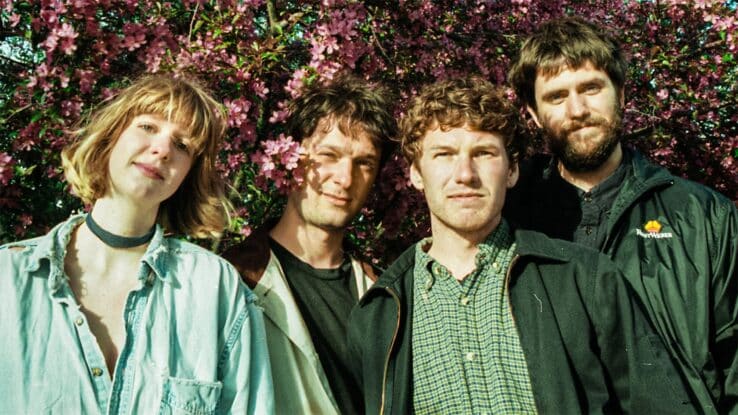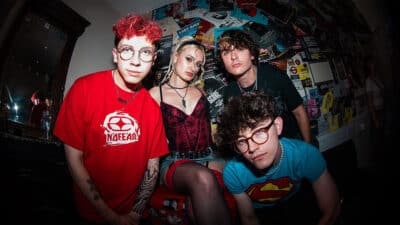Interview

Interview
Slow Pulp: “Being there for each other as a band is the most important thing”
Vocalist and guitarist Emily Massey on the folk-rockers growing together as they prepare to take latest LP Yard on a UK tour
Slow Pulp’s debut album, 2020’s Moveys, emerged out of an onslaught of misfortune for vocalist and guitarist Emily Massey. First, she was diagnosed with Lyme disease and chronic mononucleosis. Then both of her parents were in a car accident, prompting her to move back home to take care of them. And to cap it all off, just after that the Covid lockdown began. If you were to imagine yourself trying to write an album through all of this, you’d maybe envision pushing it to the side or scrapping it entirely. But Slow Pulp wrote a great one, a cut of shoegazey alt-country that promised a bright future for the Chicago-via-Wisconsin band.
Last month they released their second full-length, Yard, which expands even further on that promise. You just have to hear the opening seconds of the first track ‘Gone 2’ to become intrigued; to hear how front-woman Emily Massey’s ear-worm melodies meld perfectly with the band’s brooding instrumentals. The foursome’s pop songwriting skills are never sharper than on the single ‘Doubt’ — you’ll be humming that chorus for a long time — while the title track shows they can excel at an off-kilter piano ballad too. It’s little wonder they’ve signed to ANTI- Records (Nick Cave & The Bad Seeds, Danny Elfman, Wilco) and been tapped for support slots by the Pixies and Death Cab For Cutie.
That they’ve persevered through such tough circumstances and come out the other end a stronger band is something they credit to their tight friendship; the three members of the band besides Massey (guitarist/producer Henry Stoehr, bassist Alex Leeds and drummer Teddy Matthews) have been close since elementary school, with Massey joining the fold during college. And while there was a little more breathing room during the making of this record, Massey found she’d learned a lot from the tough circumstances of Moveys about how she liked to create. In an effort to recreate the isolation that had been forced back then, she wrote the bones of the songs on Yard while spending time alone in a cabin in the mountains. And while last time her dad (also a musician) recorded her vocals at his home studio because no other ones were open, this time she asked him to do it again.
With their first ever UK headline tour about to begin, Massey explains her creative process and the band’s enduring friendship.
You worked with your dad to record your vocals on the last album out of necessity, and you decided to do this one with him too. What works for you about working with your dad?
I was a bit nervous the first time we went about it, because it’s kind of unknown how you translate a creative relationship from a familial one. It ended up being really fun and working out really well. My dad is a singer in his own right, so he has a lot of tips on the tiny things that you wouldn’t necessarily notice — to open up your voice, or have some sort of power backing it, or dialling it back. And I think he also had a lot of context for what songs were about, so he was able to get me into that emotional space that ended up being necessary to record these songs. It feels like a really safe space to be able to be pretty vulnerable and emotional.
It’s interesting, how personal closeness with someone can translate to working with them creatively. Was there a process for you both of figuring that out?
We definitely had some learning curves. We argued about a lot of things. But I think we were allowed to be pretty visceral in our emotions and kinda get through it. Something about the way I am with my family, we can be harsh on each other but we’re able to push through that and get on the other side pretty quickly, which I’m really grateful for. And I think outside of music, being able to learn such a direct way to communicate with a family member when you’re working together, I think it’s only benefited our relationship outside of music. That’s something that I didn’t expect to come out of the process, that I’m really grateful for.
In making the last album, you were forced to work in isolation. And for this one, you realised you actually like to work isolated and secluded. What does that do for you creatively?
When I first went up to one of these cabins, I was working in a ballet school teaching ballet, and there was a Covid scare and I had to stay away for a week. So I went up to this cabin kind of last minute, and I’d never been somewhere like that completely alone. I was a bit nervous going up there. But when I got there, it was really intense, being so secluded. I felt like I was able to really open up emotionally, and be very vulnerable with myself. I think I was able to process a lot of things for the first time. Every time pretty much now that I go up there, I’ll just spend a day crying. And then I’ll feel great, and feel really in an open space to start creating.
It must take a lot of trust to then bring those songs to your bandmates and let them shape them. What does that trust feel like for you in this band?
We’ve gone through a lot together. I think that’s a trust that you earn and that grows over time, and is still growing. We support each other’s growth outside of music in such a direct way. We’re really just best friends at the core of it all, and I feel so grateful to have that.
The majority of the band are elementary school friends. How did it feel at the start to enter that dynamic?
They’ve been so close for so long, they had this kinda shared language that I had to learn. I feel really lucky because I feel like I naturally fit into that. I think really it just felt so natural when I started playing music with them that it pretty immediately felt like, these are my people. And in a way, I feel like I did grow up with them. Like, I know everything about them, and they probably know everything about me. Definitely it can be a bit intimidating, coming into a group that is so close-knit, but they were always so warm and welcoming.
Making Moveys, the circumstances were pretty arduous. With Yard, was there a sense of, ‘We can get through anything as a band?’
Yeah, totally. I think there was a lot happening during the last record process, and I think I was able to give myself the time [this time around] to more intimately process all of those things. But I felt so supported during that time by my bandmates, and still do. I think being there for each other first and foremost over anything is the most important thing. But yeah, this process felt a lot easier in some ways — and then I think a lot harder, ‘cause there is that pressure to make something just as good or better each time you make a record. But I think we tried not to think about that so much. More so just, how do we feel better in a creative process? And ideally the results of that are better music.









